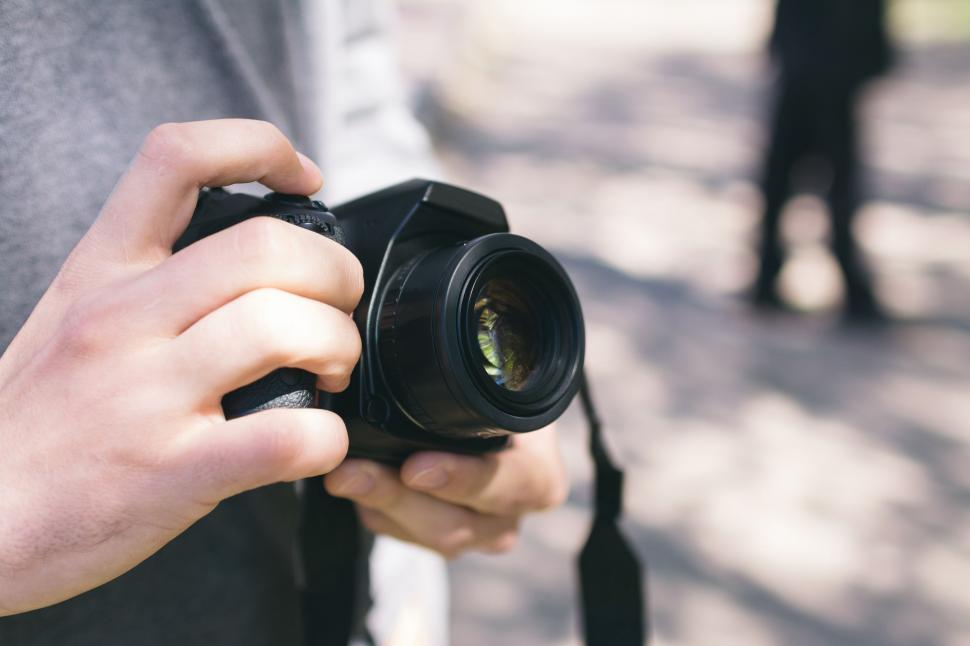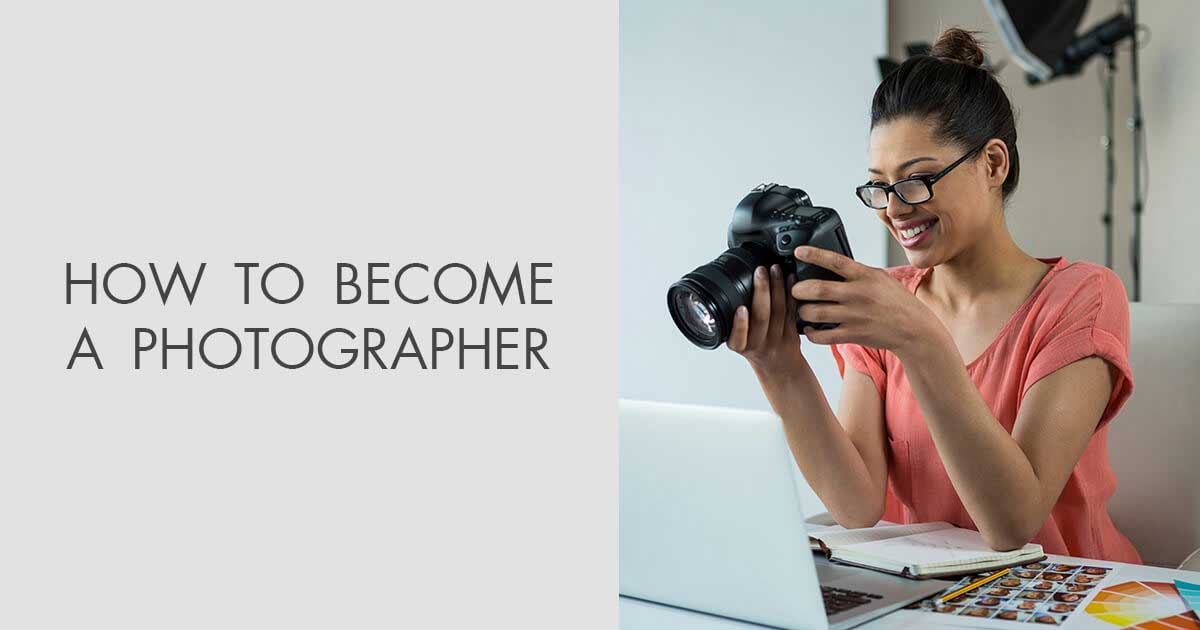Understanding how to become a photographer involves mastering camera basics and creating a strong portfolio that highlights your best work. Photography is both a vocation and a craft. You can use it to express your creativity or earn a living as a commercial photographer. You might travel the world as a portrait photographer or live a simple life behind your garden gate, taking photos of birds in the surrounding woodland. You can not learn everything about photography in a single afternoon—there’s simply so much to master. This guide will show you how to become a photographer in the UK, what qualifications you need, and the skills required for success in this field.
What Does a Photographer Do?
A photographer takes photos of objects using various cameras and equipment in different settings. They may work in a photo studio, outdoors, at events, or on commercial shoots.
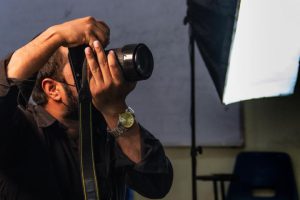
Specifically, the responsibilities of a photographer include:
- Planning and Preparation: Photographers pre-visualise their shoots, considering the subject, location, lighting, and equipment. This often involves brainstorming ideas with clients to deliver the best possible results.
- Set Up and Shoot: Photographers set up their equipment, which includes cameras, lenses, tripods, and lighting setups, then use them to take pictures. They adjust the camera’s shutter speed, aperture, ISO, and other settings to achieve the desired effect.
- Editing Photos and Retouching: After taking photos, photographers use editing software such as Adobe Photoshop, Adobe Lightroom, or Capture One to enhance the overall quality of images, adjust lighting, and retouch imperfections.
- Managing Client Relationships: Professional photographers communicate closely with clients about projects to ensure their needs are met. This includes discussing project goals, setting expectations, and delivering the final images within an agreed timeframe.
- Marketing and Promoting Services: A significant portion of a photographer’s work, especially for freelancers, involves promoting and marketing their services through websites, social media, and portfolios. They also manage pricing, composition, and communication with clients.
- Working in Specialised Fields: Photographers can specialise in various niches, such as wedding photography, portrait photography, commercial photography, fashion photography, wildlife photography, or photojournalism. Each niche may require different skills and processes.
Average Photographer Salary in the UK
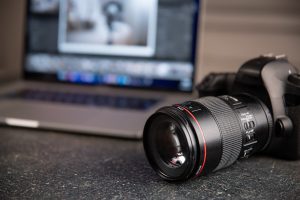
The salary for a photographer in the UK depends on their experience, the area in which they work, and their particular specialisation. In my hometown, many amateur photographers earn less than £25,000 per year, with some making even less than £10,000 annually. This may be due to a lack of experience or because they work part-time. In contrast, photographers in London have greater earning potential, with the minimum salary for a junior photographer around £20,000 per year.
Salaries for experienced or freelance photographers can range from £25,000 to £45,000 per annum, depending on their client base, reputation, and specialisation. For instance, commercial and wedding photographers typically command higher fees. A successful fashion or advertising photographer can earn significantly more, possibly over £1,000 per day for a high-profile shoot.
Key Skills for a Successful Photographer
A career as a photographer is highly demanding, requiring a blend of interpersonal skills and technical mastery. Photographers need to be technicians capable of operating complex equipment, artists who can evoke the right mood, and salespeople who can effectively market their work. Key skills required for photographers include:
- Knowledge of Cameras and Equipment: Understanding how cameras and equipment function is essential for photographers. This includes mastering concepts like aperture, shutter speed, and ISO. Applying this technical knowledge effectively allows for desired photographic effects. A solid grasp of equipment can significantly enhance image quality.
- Visual Art: Photography is a visual art form that requires a keen eye for composition and framing. While it may not be considered a fine art, it tells stories and conveys emotions. Photographers must understand how to evoke feelings through their images. This artistic vision is crucial for impactful photography.
- Photo Editing Skills: Editing is a vital part of modern photography, enhancing images for final presentation. Photographers need proficiency in software like Adobe Photoshop, Lightroom, or GIMP. These tools help refine and improve image quality, adjusting elements such as colour and lighting. Strong editing skills can transform good photos into stunning visuals.
- Attention to Detail: Success in photography often relies on meticulous attention to detail. Photographers must notice subtle elements when setting up shots and editing images. Recognising factors like composition and focus can elevate a photograph significantly. This careful consideration distinguishes a good shot from a great one.
- Communication and Interpersonal Skills: Photographers frequently engage with clients, models, and collaborators, making strong communication essential. These skills help in understanding and fulfilling the needs of various stakeholders. Building rapport can lead to more successful shoots and satisfied clients. Effective interaction enhances the overall photographic experience.
- Time Management and Organisation Skills: Effective planning and scheduling are crucial for photographers to manage their workflows. They must balance shooting, editing, and delivering final products on time. Organisation ensures that projects run smoothly and meet professional standards. Good time management helps in maintaining a positive reputation.
- Business and Marketing Skills: A successful freelance photography career requires more than just photography skills. Photographers must market themselves effectively to attract clients. This includes managing finances, preparing contracts, and developing a compelling portfolio. Strong business acumen is essential for long-term success in the industry.
How to Become a Photographer in the UK
Becoming a photographer involves both honing your technical skills and developing a professional portfolio. Here’s what you need to do to become a photographer professional photographer in the UK:

- Master Photography Basics: Before pursuing photography as a career, it’s important to understand the fundamentals. Learn how to use a camera, including how to adjust settings like aperture, shutter speed, and ISO to control exposure. You can start by reading books, watching tutorials, or enrolling in beginner photography courses. Practice is crucial in this stage. Spend time experimenting with different types of photography, such as portraits, landscapes, or macro photography, to get a feel for what interests you.
- Take a Photography Course or Degree (Optional): While formal qualifications are not essential to becoming a photographer, most aspiring professionals take courses to hone their skills. In the UK, there are several options:
- Universities and art schools offer degrees in photography (BA or BFA) that provide technical and creative training.
- Various short courses—ranging from one-day classes to two-week courses—are available nationwide through institutions such as the London School of Photography, the British Academy of Photography, or City & Guilds (which offers a one-day-a-week course over nine months). Short courses aim to give you specific skills—studio photography, digital editing, or lighting techniques.
Through formal education, you can learn more about taking pictures and building a body of work, as well as making valuable connections.
- Create a Strong Portfolio: A portfolio is a photographer’s most important tool when searching for clients or jobs. It should be a collection of your best work that reflects the type of photography you want to pursue. If possible, find a niche. For example, if you aspire to be a wedding photographer or a portrait photographer, ensure your portfolio showcases that focus. While building your portfolio, consider offering lower-cost or free photoshoots to gain experience. Once you establish yourself as a professional, include only your best work.
- Invest in Professional Equipment: You’ll need high-quality images to succeed. A DSLR or mirrorless camera, along with 1-2 versatile lenses (a 50mm prime lens or a zoom lens is ideal), is a good starting point. Consider the following items as especially helpful:
- Tripods for stability
- Lighting kits for studio shoots
- Reflectors for outdoor shoots
- Editing software like Adobe Lightroom or Photoshop
- As your career progresses, you can invest in more specialised equipment, such as telephoto lenses for wildlife photography and portable lighting kits for location shoots.
- Practice Makes Perfect: No amount of studying will make you a better photographer. Photography is a practice-driven art. To improve your skills, you should:
- Assist professional photographers on shoots
- Offer to photograph events for friends or family
- Volunteer to shoot for local organisations or businesses
- Participate in photography contests or exhibitions
- This hands-on experience is the best way to learn the photography business and develop skills such as lighting, posing, managing your subjects, and arranging your equipment.
- Start Freelancing or Find Work: Once you’ve honed your skills and built a strong portfolio, you can begin offering your services as a freelance photographer. Freelance photography allows you to work on projects you want and lets you set your own hours, but it also requires you to find jobs and manage your marketing, clients, and finances. You may also consider working for a photography studio, magazine, newspaper, or commercial brand, as many companies employ staff photographers or commission freelance photographers for projects such as product shoots, corporate events, or editorial features.
- Brand Yourself and Market Yourself: Build a brand as a successful photographer. Create a professional website featuring your portfolio and services. Use social media platforms like Instagram, Pinterest, and Facebook to share your images and connect with potential clients. Network with others through photography groups and events.
Tips for Aspiring Photographers
If you’re considering starting a career as a Photographer, here are some tips to help you on your journey:
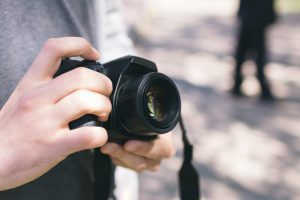
- Keep Learning: Photography is a field that’s constantly evolving, with new techniques and technologies emerging regularly. To stay competitive, it’s crucial to keep yourself informed about these advancements. Attend workshops, read industry publications, and follow influential photographers online. Consider enrolling in advanced courses to deepen your expertise. Continuous learning not only enhances your skills but also keeps your work fresh and relevant.
- Find Your Niche: Selecting a niche, such as wedding photography or wildlife, allows you to develop a unique specialty that sets you apart. By focusing your efforts in one area, you can refine your skills and build a recognisable style. This targeted approach makes it easier to create a portfolio that showcases your strengths. Additionally, it helps streamline your marketing efforts, as you can tailor your promotions to a specific audience. A well-defined niche can lead to more meaningful connections with clients who appreciate your expertise.
- Community: Engaging with photography communities, both local and online, can provide invaluable support and inspiration. By interacting with other photographers, you can exchange ideas, tips, and experiences that enrich your own practice. Participating in forums or attending meetups allows for constructive feedback on your work. These connections can lead to collaborations, referrals, and new opportunities. Building relationships within the photography community fosters a sense of belonging and encouragement as you navigate your career.
- Keep It Organised: The life of a freelance photographer can often feel chaotic, with numerous clients and projects to manage. Staying organised is essential for maintaining control over your workload and deadlines. Utilise scheduling apps to keep track of appointments and shoots, ensuring you never miss an important date. Invoicing software can streamline your billing process, making it easier to manage finances. Project management tools help you oversee multiple assignments, allowing you to focus on your creative work without getting overwhelmed.
Get Qualified as a Photographer
Digital Photography Certification, Photography Essentials Course, Photography Online Course, Photography Diploma
Frequently Asked Questions
Why Should You Become a Photographer?
Photography can be a fulfilling career for those who enjoy a combination of creative and technical expression. It serves as an outlet for creative expression and a way to capture significant moments in people’s lives. If visual storytelling is your passion and you thrive in a fast-paced environment, photography can be a rewarding career.
Is a Career as a Photographer Right for You?
Being creative, paying attention to detail, and working well independently are all good indicators that a career in photography could be for you. You will excel if you’re self-motivated, responsive to technology, and capable of handling the pressures of freelancing or owning your own business. If you enjoy working with people, capturing moments that evoke emotions or tell a story, and being part of a community that celebrates artistry and innovation, photography offers the freedom to explore many potential paths. However, it’s important to remember that the field is highly competitive, and building a successful photography business requires grit and continuous learning.
What Are the Salary Prospects for Photographers in the UK?
Photographer salaries vary based on experience, the type of photography you specialise in, and whether you are a freelancer or employed by a company. Entry-level photojournalists and staff photographers typically earn between £15,000 and £20,000. With more experience or if you specialise in a high-demand field such as wedding photography or commercial photography, you can earn between £25,000 and £45,000 per year. Freelancers with a solid reputation can earn significantly more, and those specialising in areas like fashion or advertising may earn £1,000+ per day for high-end shoots.
What Qualifications Are Needed to Become a Photographer?
In the UK, no formal qualifications are necessary to become a photographer. However, taking photography courses or obtaining a degree in the field can provide you with the technical skills needed to operate a camera and build a portfolio. While some of the most successful photographers are self-taught, those who pursue higher education in photography, art, or design typically learn essential skills in camera technology, editing software, lighting, and composition. Additionally, these programmes offer valuable networking opportunities and access to industry professionals.
Do You Need Work Experience to Start a Career in Photography?
While paid formal work experience isn’t a requirement, gaining experience is essential for honing your skills and developing a portfolio. You could assist a working photographer, take part in a photography internship, or agree to shoot events or projects for friends, family, or a local business. These opportunities will provide hands-on experience and help you understand what it’s like to work with clients, as well as how a professional photographer manages a shoot.
What Is the Career Outlook for Photographers?
The demand for photographers remains strong—especially in areas like wedding and commercial photography, social media content production, and product photography. Additionally, the rapid growth of digital media has created immense demand for photographers in content creation and marketing within the online space. While the photography field is competitive, photographers can stay ahead of the curve by specialising in niche markets, keeping up to date with the latest trends and technology, and maintaining a strong online presence.
What Are the Career Progression Options for Photographers?
Photographers can build a reputation within their niche, grow their client base, and develop a diverse portfolio. Established photographers may further specialise in areas such as fashion, advertising, editorial, or fine art photography, allowing them to command higher rates. They may also transition into related fields like photo editing, videography, or art direction. Those who establish a successful business may begin teaching and offering photography workshops or courses online.
What Are the Exit Options and Opportunities Beyond Photography?
Skills such as creativity, an eye for detail, client management, and technical expertise are highly transferable to other creative industries. Many photographers find they can leverage their portfolio management skills into careers in graphic design, videography, marketing, or content creation. Others may move into photojournalism, digital media, or advertising, where their strengths in visual storytelling can be applied in different media spaces.

